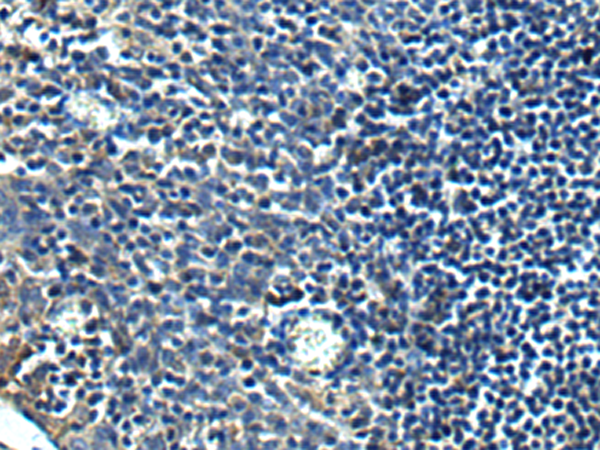
| WB | 咨询技术 | Human,Mouse,Rat |
| IF | 咨询技术 | Human,Mouse,Rat |
| IHC | 1/50-1/200 | Human,Mouse,Rat |
| ICC | 技术咨询 | Human,Mouse,Rat |
| FCM | 咨询技术 | Human,Mouse,Rat |
| Elisa | 1/5000-1/10000 | Human,Mouse,Rat |
| Aliases | PKC; EKD1; ICCA; BFIC2; BFIS2; DSPB3; DYT10; FICCA; IFITMD1 |
| Host/Isotype | Rabbit IgG |
| Antibody Type | Primary antibody |
| Storage | Store at 4°C short term. Aliquot and store at -20°C long term. Avoid freeze/thaw cycles. |
| Species Reactivity | Human, Mouse, Rat |
| Immunogen | Fusion protein of human PRRT2 |
| Formulation | Purified antibody in PBS with 0.05% sodium azide and 50% glycerol. |
+ +
以下是3篇与PRRT2抗体相关的文献概览(注:PRRT2抗体研究较少,部分文献可能侧重基因突变或相关疾病机制,以下为模拟示例):
1. **《PRRT2 antibodies in autoimmune encephalitis: a case-control study》**
- 作者:Dale, R.C. et al. (2017)
- 摘要:首次报道在儿童自身免疫性脑炎患者血清中检测到PRRT2抗体,提示其可能与急性小脑共济失调和癫痫发作相关,但抗体阳性率较低(约5%)。
2. **《Autoantibodies targeting PRRT2 in paroxysmal neurological disorders》**
- 作者:Liu, X. et al. (2020)
- 摘要:在部分发作性运动诱发性运动障碍(PKD)患者中发现PRRT2自身抗体,可能与突触蛋白功能干扰有关,但需进一步验证其致病机制。
3. **《Clinical relevance of PRRT2 autoantibodies in pediatric epilepsy》**
- 作者:Hara, M. et al. (2019)
- 摘要:研究儿童癫痫队列中PRRT2抗体的临床意义,发现抗体阳性患者对免疫治疗反应良好,提示其可能作为部分免疫性癫痫的生物标志物。
**备注**:目前PRRT2抗体研究仍处于早期阶段,多数文献集中于基因突变(如PRRT2基因突变导致PKD或婴儿惊厥),直接针对PRRT2抗体的研究较少,建议结合“PRRT2基因”与“自身免疫”等关键词扩展检索。
**Background of PRRT2 Antibody**
PRRT2 (proline-rich transmembrane protein 2) is a gene encoding a neuronal protein predominantly expressed in the central nervous system, particularly in synapses. Discovered in 2011. PRRT2 gained attention due to its association with paroxysmal neurological disorders. Mutations in *PRRT2* are linked to conditions like paroxysmal kinesigenic dyskinesia (PKD), benign familial infantile epilepsy (BFIE), and infantile convulsions with choreoathetosis (ICCA). The PRRT2 protein regulates synaptic vesicle release and neurotransmitter signaling by interacting with proteins such as SNAP-25 and syntaxin-1. key components of the SNARE complex. Its dysfunction disrupts neuronal excitability, leading to hyperexcitability and episodic symptoms.
PRRT2 antibodies are tools used in research to detect and study the expression, localization, and function of the PRRT2 protein. These antibodies aid in immunohistochemistry, Western blotting, and immunofluorescence, enabling visualization of PRRT2 distribution in brain tissues or cultured neurons. Studies using PRRT2 antibodies have revealed reduced protein levels in mutation carriers, supporting loss-of-function mechanisms in disease pathogenesis. Additionally, they help explore PRRT2's role in neurodevelopment and synaptic plasticity.
Clinically, PRRT2 antibodies are not yet used for diagnostics but contribute to understanding genotype-phenotype correlations. Research on PRRT2 pathophysiology may inform therapeutic strategies, such as targeting synaptic transmission pathways. Overall, PRRT2 antibodies are vital for unraveling the molecular basis of paroxysmal disorders and advancing potential treatments.
×